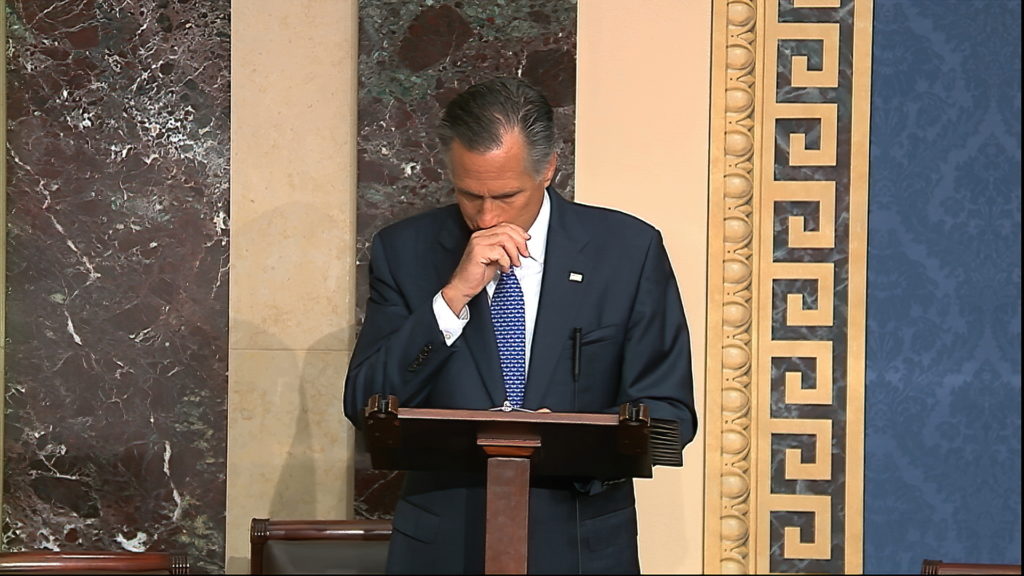
In this image from video, Sen. Mitt Romney, R-Utah, speaks on the Senate floor about the impeachment trial against President Donald Trump at the U.S. Capitol in Washington, Wednesday, Feb. 5, 2020. The Senate will vote on the Articles of Impeachment on Wednesday afternoon. (Senate Television via AP)
WASHINGTON (AP) — Utah Sen. Mitt Romney said Wednesday he will vote to convict President Donald Trump, becoming the first and likely only Republican to break ranks in the Senate’s impeachment trial and favor removing Trump from office.
In a remarkable spectacle, Romney’s decision meant the GOP’s unsuccessful 2012 presidential nominee would be voting to oust a Republican president who seldom hides his contempt for the well-mannered party establishment that the patrician Romney symbolizes.
As Trump plunges into his reelection effort, Romney’s move also denied Trump a campaign talking point of asserting he had been unanimously acquitted by Republicans in a strictly partisan drive to remove him.
And it stood as the most noteworthy vote of rebellion against Trump by a congressional Republican since 2017. At that time, Sen. John McCain, R-Ariz., pointed his thumb downward in a post-midnight vote that derailed Trump’s signature effort to dismantle President Barack Obama’s health care law.
Romney announced his verdict during an eight-minute speech on the Senate floor two hours before the GOP-dominated chamber was set for votes that were virtually certain to acquit Trump. Romney cited the significance of the impeachment oath to render “impartial justice” sworn to by all senators.
“I am profoundly religious. My faith is at the heart of who I am,” Romney, a member of the Church of Jesus Christ of Latter-day Saints, said before pausing for about 11 seconds, seemingly struggling with his emotions.
“The grave question the Constitution task senators to answer is whether the president committed an act so extreme, so egregious, that it rises to the level of a high crime and misdemeanor,” Romney said. “Yes, he did.”
In a statement released by his office, Romney said he would vote to convict Trump for the impeachment article accusing him of abuse of power, but to acquit the president on the second count of obstructing Congress’ investigation of his actions toward Ukraine.
In an interview on Fox News, Romney said he believed the Democratic-run House should have exhausted all legal remedies for hearing witnesses and receiving documents, which Trump blocked, before impeaching him for obstruction.
Romney’s willingness to break with his colleagues recalled the willingness of his own father, the late Michigan Gov. George Romney, to support the civil rights movement in the early 1960s.
Assessed from a personal level, the clash between Trump and Romney came as little surprise. The two men have crossed swords frequently since Trump began his presidential campaign in 2015.
Still, it threatened to expose him to the kind of demonization experienced by recent GOP lawmakers defying Trump. Republican Sens. Jeff Flake of Arizona and Bob Corker of Tennessee both decided against seeking reelection in 2018 after criticizing Trump.
Trump did not immediately take to Twitter to react. But the chairwoman of the Republican Party did in an email sent to reporters headlined, “Romney turns his back on Utah.”
“This is not the first time I have disagreed with Mitt, and I imagine it will not be the last,” tweeted Ronna McDaniel. “The bottom line is President Trump did nothing wrong, and the Republican Party is more united than ever behind him.” The senator is her uncle.
While other GOP criticism seemed certain to follow, Romney seemed likely to suffer little blowback back home. Trump and his frequently coarse displays are not strongly popular in the overwhelmingly Mormon Utah, but Romney is. And at 72 and in the second year of his six-year Senate term, Romney is unlikely to face a political challenge there anytime soon.
Romney’s announcement made him the first senator to bolt what has so far been a strict party-line divide over whether to force Trump from office.
On the Senate floor, Romney cited the allegation that Trump delayed U.S. military aid to Ukraine for its war with Russian-backed fighters until the embattled country’s new leaders agreed to investigate Biden.
“The president’s purpose was personal and political,” said Romney. “Accordingly, the president is guilty of an appalling abuse of public trust.”
He called Trump’s pressure campaign “a flagrant assault on our electoral rights, our national security and our fundamental values.”
Romney said he’s received “numerous” phone calls and text messages demanding that he “stand with the team.” But he said if he voted against his belief that Trump was guilty, it would “expose my character to history’s rebuke and the censure of my own conscience.”
Romney opposed Trump’s bid early on and said he lacked the temperament and judgment to be president, calling him “a phony, a fraud.” Trump has called Romney a “pompous ass.” Trump ostentatiously interviewed Romney as a potential secretary of state, only to reject him.
Romney has backed Trump in Senate votes 80 percent of the time, one of the lowest marks for Republicans, according to the website fivethirtyeight.com. Romney has opposed Trump on high-profile issues such as Trump’s attempt to unilaterally shift federal dollars to building a wall along the Mexican border.

